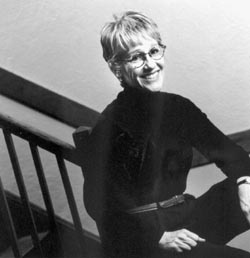Mayman to step down as director ofOffice for the Arts
 Myra Mayman, the founding director of Harvard’s Office for the Arts (OFA), has announced that she will step down at the end of June. In letters and phone calls to dozens of staff members, alumni/ae, advisers, students, and other friends of the OFA this week, Mayman demonstrated the personal touch for which she is known and explained the reasons for her decision.
Myra Mayman, the founding director of Harvard’s Office for the Arts (OFA), has announced that she will step down at the end of June. In letters and phone calls to dozens of staff members, alumni/ae, advisers, students, and other friends of the OFA this week, Mayman demonstrated the personal touch for which she is known and explained the reasons for her decision.
“I’ve decided to move on for personal reasons,” Mayman said. “My husband made me an offer I can’t refuse: a life of international travel and romance. I also have some writing and consulting projects I’d like to pursue.”
“For 27 years, Myra has brought her wonderful creativity to the Office for the Arts,” said Jeremy R. Knowles, Dean of the Faculty of Arts and Sciences (FAS), under whose purview the OFA falls. “Gently but inexorably, she has increased the opportunities in art for a remarkable proportion of undergraduates in the College. We shall miss the freshness of her ideas and the clarity of her vision.”
The Office for the Arts was established in 1973 by Radcliffe President Matina Horner and Harvard President Derek Bok with the encouragement of an FAS ad hoc committee on extracurricular arts at the University. The OFA added to the Radcliffe Creative and Performing Arts Program, which had been in place for many years. When Mayman was tapped to lead the new office, she retained successful Radcliffe-based programs in theater, dance, ceramics, and figure drawing. She went on to create and nurture a wide variety of programs and publications, including publishing “Practice and Performance,” an annual guide to the arts at Harvard; “Dance at Harvard: a Harvard student’s guide to dance;” and the Arts Spectrum newsletter.
The OFA runs significant facilities and services, including Agassiz Theatre, Rieman Center, Sanders Theatre, Lowell Hall, 74 Mt. Auburn Street, the Ceramics Studio, Harvard Box Office, and the Event Planning workshop and Web site. To fulfill its mission of integrating creative thinking and expression into undergraduate education, the office has brought more than 550 artists into contact with students through its Learning From Performers visiting artist program and longer residencies by artists in jazz, theater, and public art. In addition, the office has commissioned many new works by artists as laboratory experiences for students.
As well as establishing scholarships and grants for undergraduates interested in pursuing music lessons or developing their own arts projects, Mayman, at the request of actor John Lithgow ’67 and President Neil L. Rudenstine, instituted the highly successful annual arts festival at Harvard. Arts First, a celebration of students and faculty in the arts, has been very popular in the Harvard and Cambridge communities.
Lithgow kicks off the Arts First celebration every year and says he plans to keep doing so. On hearing that Mayman will step down, however, he showed about as much restraint as might his “3rd Rock From the Sun” character, Dick. “Oh, my god!” he said. “Oh, no! Oh, this is dreadful news!”
As flattering as such consternation may be, Mayman underscores her excitement about the arts organization’s future.
“Now that the OFA is fully ensconced at Harvard as a result of the Radcliffe-Harvard merger, with an extremely talented and dedicated staff,” she said, “it is time for the next phase of the OFA’s development: making ties to the curriculum and connecting undergraduates’ individual creativity to the broader perspective of the role of the arts in American democracy. Stay tuned to OFA.”
According to Knowles, a committee will be assembled in the coming weeks to search for Mayman’s successor. Mayman plans to remain president of the Signet Associates, the graduate board of the Signet Society, for the near future.




